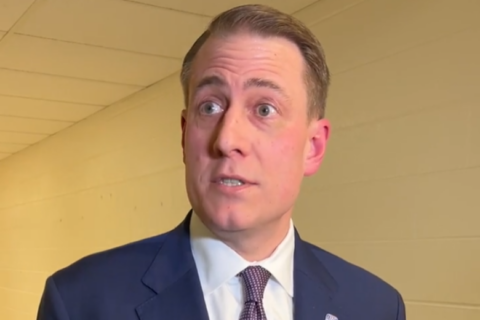CATONSVILLE, Md. — A Montgomery County basketball player who played all season wearing her hijab was benched by a referee at the regional girls basketball finals over a rarely enforced rule restricting what headgear players can wear during a game.
It was supposed to be a basketball game Je’Nan Hayes would look back on with a smile.
In her first season playing organized sports, the 16-year-old and her Watkins Mill High School teammates were headed to the regional finals in Prince George’s County. Despite her coach’s pattern of playing Hayes in the fourth quarter, the final quarter came and went, all while the junior inexplicably sat on the bench. At the buzzer, the team had lost.
“My coach had pulled me aside, and she had said that she was sorry that I couldn’t play. But there was a state rule saying that I have to have a letter to play with my hijab on,” said Hayes, who is Muslim.
Hayes said she cried when she learned why she was benched.
Three minutes before tipoff, Coach Donita Adams said she was informed that Hayes was not eligible to take the court. A referee cited a rule requiring a religious exemption letter from the state for Hayes to wear religious headgear. It was the first time Adams had heard of the rule in two years of coaching.
“I didn’t agree with what was going on. She played all 24 games and then on the 25th game she wasn’t able to play,” said Adams, the varsity basketball coach at Watkins Mill.
The rule comes from the National Federation of State High School Associations and is enforced at the state level.
“We’re just trying to figure out why there needs to be documentation and for what cause,” said Adams. “Because everyone deserves to play.”
Adams said earlier in the season around Ash Wednesday, a Christian holiday, a number of her players took the court with an ashen cross on their foreheads and were not prevented from play.
“Reasonable religious accommodation is what’s key here,” said Zainab Chaudry with the Council on American-Muslim Relations. She manages the Maryland Outreach Center located in Catonsville.
“The governing bodies who make these rules just have to keep in mind they cannot discriminate against players because of their religious beliefs,” Chaudry said.
Instead of feeling discouraged by her experience, Hayes describes herself as motivated by it and wants those who make the rules to re-evaluate them.
“How come they have not taken the time to think, you know, could this affect Sikh players, Jewish players, Muslim players? I don’t think it should exist,” she said.
Chaudry said her attempts to connect with the National Federation of State High School Associations has not been successful yet. But she has had what she called positive conversations with officials at the Maryland Public Secondary Schools Athletic Association, she said.
However, no Maryland policies have been changed at this time.








